
Can a health care provider refuse to treat me because of who I am?
When you access health care services in BC, the law protects you from discrimination. You can’t be treated badly or unfairly because of any part of your identity protected under human rights law, such as your race, sex, or any disability. Learn to identify discrimination, and steps to take if you’re discriminated against.
Content warning
This page describes experiences of discrimination, including racism and homophobia. It may bring up difficult or traumatic memories or emotions.
What you should know
"I work in construction. The work is hard but it feels good to build things. One day, after working 12 hours straight, I had sharp pains in my back and leg. I went to the hospital. I felt weak and threw up a couple of times. I heard a nurse say I was probably drunk. When I finally saw a doctor, they asked me what I’d been drinking. They assumed I was drunk because I’m Indigenous. X-rays showed I had a herniated disc. I’m hoping for an apology from the hospital."
– Joseph, Kamloops, BC
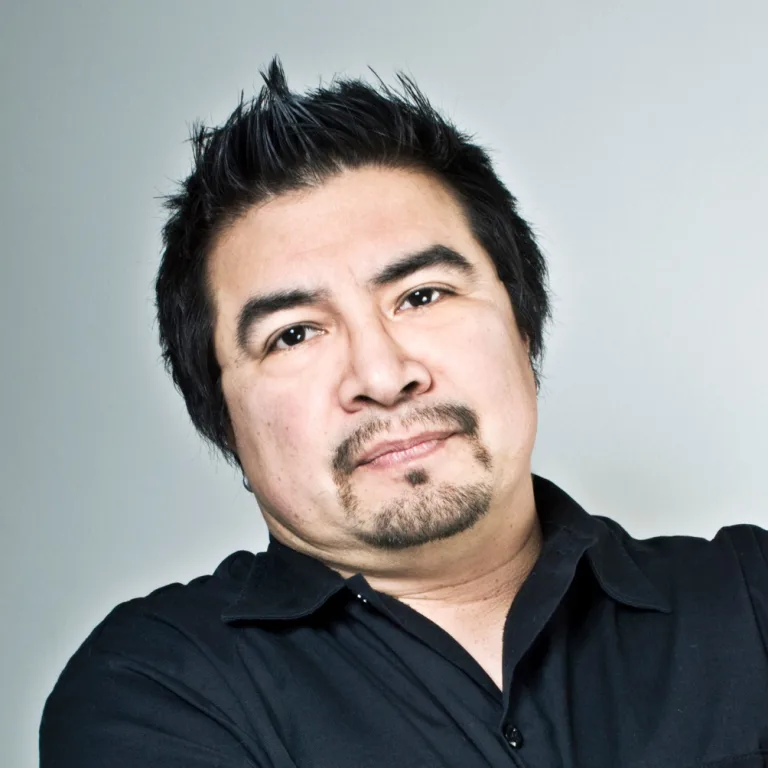
Human rights law helps protect everyone from discrimination. When you visit a health care provider, you can’t be treated badly or unfairly because of these parts of your identity:
your race, colour, ancestry, or where you're from
your Indigenous identity
your sex, sexual orientation, or gender identity or expression
your age
any physical or mental disability
your marital status
your family status, such as if you have kids
your religion
The law calls these protected characteristics.
A health care provider can’t treat you badly or unfairly based on one of these characteristics. Or refuse to give you a health care service or treatment (without a reasonable and valid reason).
Discrimination can take many forms
Discrimination may be explicit, such as when someone uses a racist slur. But often it’s hidden or subtle. Consider this example. You’re a person of colour, sitting in a hospital waiting room for several hours. You notice some patients who came in after you are seen before you. This might be discrimination. But the other patients may have had more urgent medical needs. It’s hard to know if your colour factored into your longer wait. (Below we walk you through what you’d need to show.)
Sometimes the systems you interact with can work to discriminate against you. This is called systemic discrimination. It includes rules, policies, and patterns of behaviour that privilege some groups and disadvantage others. There’s well-documented systemic discrimination against Indigenous Peoples in accessing health care in BC. We explore this here.
Under BC law, a health care provider is someone who’s licensed, certified or registered to provide health care. Health care is defined broadly, as anything done related to health. The list of health care providers is a long one. It includes doctors, nurses, dentists, pharmacists, optometrists, massage therapists, physiotherapists, chiropractors, and psychologists, among others.
Health care providers have a duty to accommodate
Health care providers can’t discriminate against you. They also have to take all reasonable and practical steps to accommodate your protected characteristics. This duty to accommodate includes changing a policy, practice, or service that negatively affects you due to any protected characteristic. You can ask your health care provider to make changes to better meet your needs.
But there are reasonable limits on how far your health care provider has to go to accommodate your needs. Sometimes it isn’t possible because it would cost too much. Or it may create health or safety risks. This is called undue hardship.
Health care providers must follow professional standards
Health care providers must also follow the rules of their regulatory body. These professional groups set standards their members must follow. If a health care provider acts unprofessionally, unsafely, or unethically, the regulatory body can take action against them to protect the public.
Take doctors, for example. The College of Physicians and Surgeons of BC regulates doctors in BC. It has a practice standard about access to medical care. That standard says that all patients have a right to access medical services, free from discrimination. If a doctor discriminates against someone, the College can issue a fine, suspension, or other penalty.
(Note this practice standard also recognizes that doctors have the right to not take on patients for valid reasons. An example would be if the doctor’s office is already at capacity. Another would be if the doctor doesn’t have the specialized knowledge to treat a patient with a specific health issue.)
No one working in health care can discriminate
It’s not just health care providers who can’t discriminate. No one in the health care field can mistreat you on the basis of who you are. When you attend a doctor’s office, the receptionist or security guard (among others) can’t treat you badly because, for example, you’re Asian, transgender, or a Buddhist.
With health care, it can be hard to figure out what behaviour is discriminatory, as compared to merely frustrating or disappointing. For example, let’s say a doctor refuses to give you a certain medication you want. Is that discrimination? Not if the doctor’s decision is based on their medical judgment about the most appropriate treatment for you.
There are two parts to this. First is whether the health care provider’s behaviour is based on a protected characteristic. If so, that could be discriminatory. For example, let’s say someone is seeking help exploring their gender identity. A therapist they approach declines to take them on as a patient. If the therapist’s decision was because of the person’s gender identity, that would be discriminatory.
But there’s more to consider. Even if the treatment might be discriminatory, it could be justified. In our example, the therapist’s refusal could be justified, if (for example) they aren’t qualified to provide the person with the care needed.
Here are some more examples. (Note these are sample scenarios only. Whether treatment is discriminatory or not will depend on all the circumstances in a particular situation.)
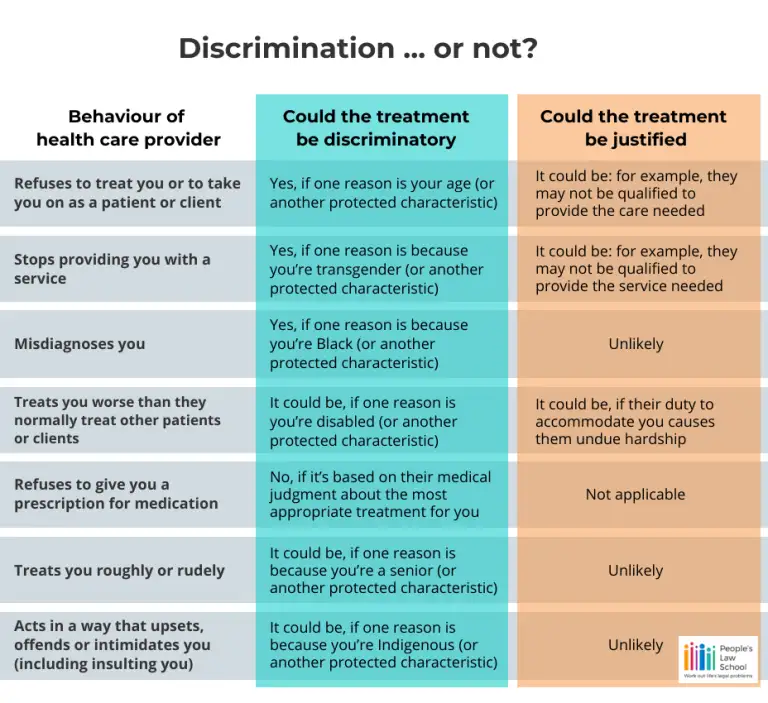
If you believe you’ve been treated in a discriminatory way by a health care provider, you have options.
You can, for example, complain directly to the health care provider. Or you can make a complaint to the regulatory body that oversees them. Another option is to make a human rights complaint. Or you can do a combination of these.
We walk you through the choices next, under work out the problem.
If you're Indigenous and experience discrimination
If you’ve been discriminated against as a First Nations, Inuit or Métis person, there are steps you can take. We explain them here.
Work out the problem
If you think you’ve experienced discrimination, the first step is to get your thoughts together. A good way to do this is to write down your story. Just a few paragraphs or bullet points can relieve stress and clarify things.
Make sure you note:
What happened: describe the way you were treated unfairly.
Why you think this happened: the protected characteristic you think was a factor in the unfair treatment.
The impact: details of how this experience has had a negative effect on your life.
Who else is involved: as in, who can back up your story.
If the discrimination results from a rule or policy, write down when you first noticed the problem. Get a copy of any document that includes the rule or policy.
Also think about what you want to happen. Presumably you want the discrimination to stop. Is that enough on its own? Are you hoping for an apology? Or for the other party to commit to change their approach in situations like yours? Or something else to happen?
Sometimes it can be hard to figure out whether you were discriminated against. Your answers to these three questions can help you decide:
Is a protected characteristic in play? (See above, under what you should know, for the personal characteristics protected from discrimination.)
Was I treated in a way that had a negative impact on me?
Was the protected characteristic one of the factors in how I was treated?
You’ll need to show how the answer is ‘yes’ to all three of these questions in order to show you were discriminated against. (The protected characteristic doesn’t need to be the only or most important factor in how you were treated. It just needs to be a partial factor.)
Next, clarify your options. These might include making a complaint with the regulatory body that oversees the health care provider. Or making a human rights complaint. Or both.
Consider getting legal advice
At this point, it can be very helpful to speak to a legal professional. They can help explain your rights and your options. The BC Human Rights Clinic offers a range of free legal services, including summary advice. (If you are Indigenous, you can ask to speak directly to an Indigenous legal advocate.) The Lawyer Referral Service can help connect you with a lawyer for a free 15-minute consult. For more options, see below under who can help.
If you’ve been treated badly or unfairly by a health care provider, you can talk to them directly. They may not be aware their words or actions negatively affected you. Raising your concerns can often be the fastest way to resolve things.
That said, raising a problem directly with the person who has mistreated you isn’t easy. You may find your health care provider intimidating, unapproachable, or unavailable. In that case, you might prefer making a written complaint, or taking one of the next steps.
If you believe your health care provider has discriminated against you, you can make a confidential complaint with the regulatory body for their profession.
How to make a complaint
Each type of health care provider has a regulatory body. Each body has its own process for handling complaints; this video explains the general process.
Typically, complaints must be made in writing. The regulatory body can investigate and make a decision. They may decide, for example, to review the health care provider’s practice, require them to take further training, or (in serious cases) suspend or disqualify them.
For example: if your complaint is about a doctor
Say you’re concerned about how a doctor has treated you. You can file a complaint with the College of Physicians and Surgeons of BC. To do this, you complete a complaint form or write a letter, and send it to the College. They’ll investigate and send you a written decision. Here, we explain the process more fully.
You can take multiple steps at the same time
You can take other actions at the same time you complain to the health care provider's regulatory body. For example, you can bring a human rights complaint or sue the health care provider — you don’t have to wait for your complaint through the regulatory body to be resolved.
If you believe you’ve been discriminated against, you can make a formal human rights complaint. This involves going to the BC Human Rights Tribunal. It operates like a court but is less formal.
If you prove you’ve been discriminated against, the tribunal can make an order to compensate you. They can also order other remedies. For example, they can order the discrimination to stop and that the health care provider take training.
We walk you through what’s involved in making a human rights complaint.
Protection from retaliation
If you bring a human rights complaint for discrimination, the health care provider can’t punish you for doing so. This is considered retaliation. It’s illegal. The BC Human Rights Tribunal has more on retaliation.
Common questions
If you’re concerned about the care you or a loved one received at a hospital, you can start by making a complaint to the hospital. If your concern involves a doctor in a hospital, raise your concerns with their department head or the hospital’s medical director. They will then follow the hospital’s complaints process.
If that doesn’t solve the problem, you can make a complaint to the Patient Care Quality Office in your health region. Each health authority in BC has one of these offices: here is contact information.
If you’re not satisfied with that office’s handling of your complaint, you can request a review.
If you’re Indigenous, you can contact the First Nations Health Authority’s Quality Care and Safety Office. They’re set up to help First Nations and Indigenous patients in BC make complaints in a culturally safe way.
A health care provider regulatory body can’t pay you any money. Nor can it order a health care provider to pay you any money. If you want monetary compensation from a health care provider, you’ll have to bring a human rights complaint or sue them in court. Note in each case there are time limits involved.
Who can help
The BC Human Rights Tribunal lists organizations that can help if you feel you’ve been discriminated against. Below are some of the key ones.
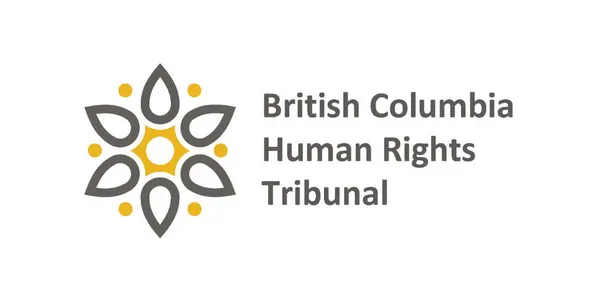
BC Human Rights Tribunal
Receives and resolves discrimination complaints under BC law.
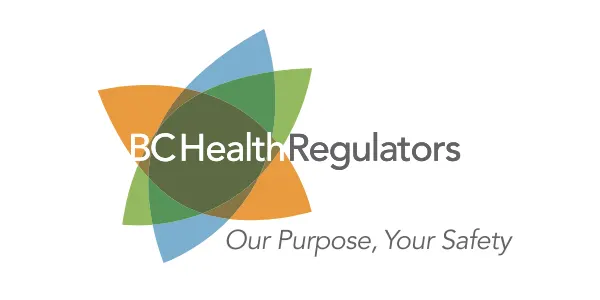
BC Health Regulators
Represents regulators overseeing chiropractors, midwives, and other health care providers.
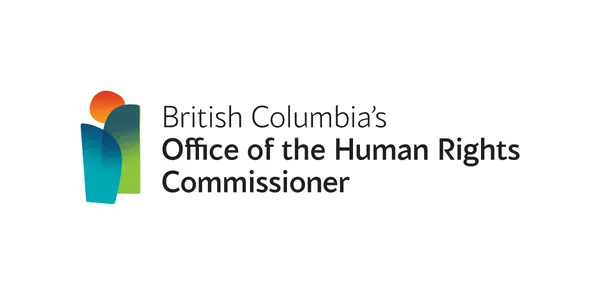
BC’s Office of the Human Rights Commissioner
Works on systemic human rights issues and educates people about human rights in BC.
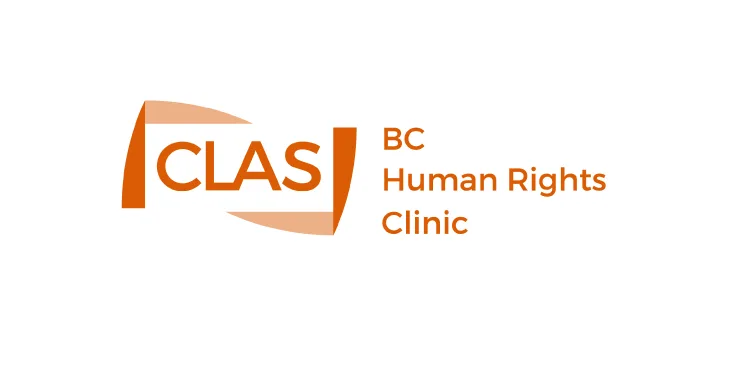
BC Human Rights Clinic
Provides free assistance and representation to those who qualify for help with a discrimination complaint under BC law.

Access Pro Bono's Free Legal Advice
Volunteer lawyers provide 30 minutes of free legal advice to people with low or modest income.

Access Pro Bono’s Everyone Legal Clinic
Clinicians provide affordable fixed-fee services on a range of everyday legal problems.

Lawyer Referral Service
Helps you connect with a lawyer for a complimentary 15-minute consult to see if you want to hire them.

BC Legal Directory
Search for a lawyer by community or legal issue. From the Canadian Bar Association, BC Branch.


